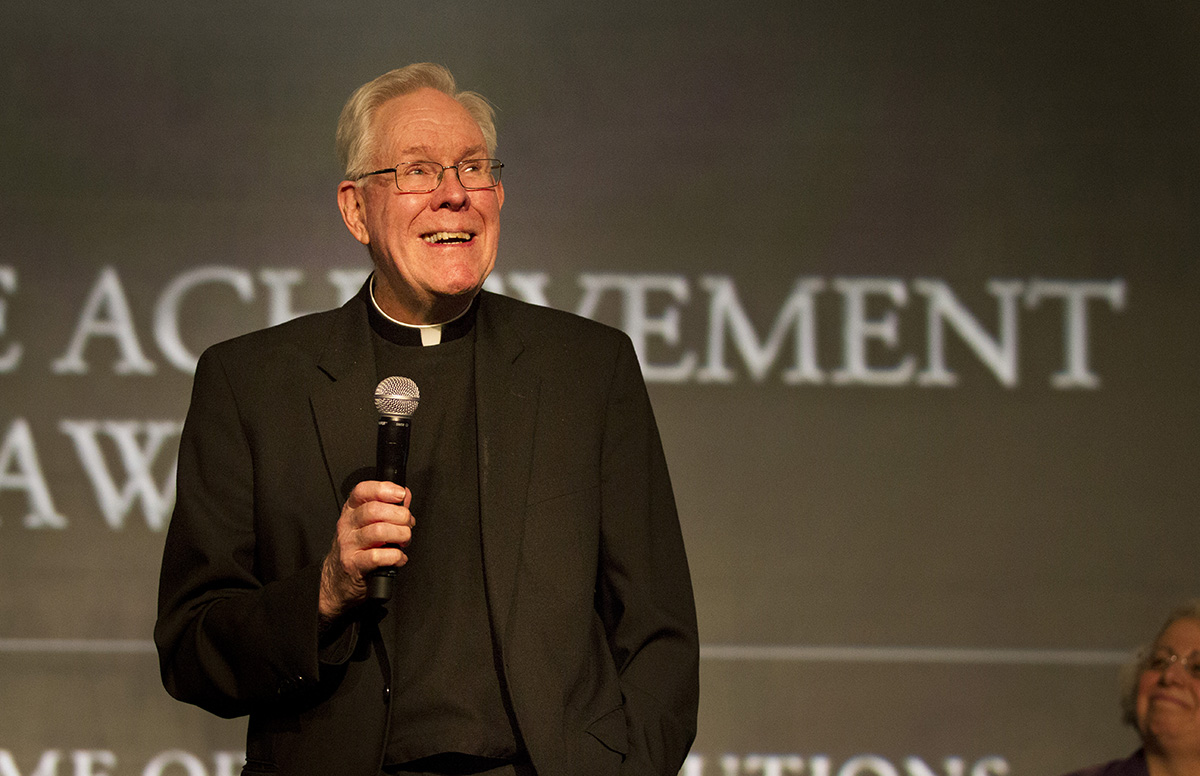Monsignor Charles J. Fahey, who died at age 90 on November 5 in Syracuse, NY, is well-remembered and respected by long-time LeadingAge members. His involvement with the association goes back almost to its very beginning. Fahey was a prominent member by the end of the first decade of LeadingAge (then the American Association of Homes for the Aging, or AAHA). Later in life he remained a great source of perspective on the aging services field and the early years of the organization. A favorite saying of his was, “The founders of AAHA were liberal Jewish social workers, retired ministers and dancing nuns.”
LeadingAge President and CEO Katie Smith Sloan recalls her first experience of Fahey’s interpersonal skills and kindness: “I had the opportunity to work closely with Msgr. Fahey when he was a delegate to a White House Conference on Aging and I was fairly new to the field. He was an amazing teacher.” She most remembers “his skillful navigation of a very challenging debate to get to a resolution all could live with. He was patient and centered, kind and determined. And, in the end, as he did all his years, closed the proceedings with his signature statement ‘Peace and all good things.’”
Former LeadingAge President and CEO Larry Minnix remembers Fahey fondly: “Monsignor Charles Fahey was not just among the founding mothers and fathers of (then) AAHA, but he was the embedded genetic strain of our association’s conscience that is still part of our LeadingAge DNA. He stood for social justice for seniors and those who care for them before social justice was a term of art. He was also our chair, the creator and sustainer of our ethical reflection mechanism, a mentor to countless leaders who came after him, a respected advocate in Washington and beyond, a trustee of member affiliated organizations, gifted speaker and prophet, and recipient of numerous awards, including our own Award of Honor. While he has passed in the flesh, he will endure through a truly unique legacy.”
Aside from his LeadingAge connections, Fahey’s resume is a stunning compilation of leadership and involvement in advocacy, educational, religious, and public policy organizations both national and international. He chaired or served on the boards of the Leadership Council of Aging Organizations, Catholic Charities USA, the Catholic Health Association of the United States, the National Council on Aging, the American Foundation for Aging Research (of which he was a founding member), and countless other organizations. He made numerous appearances before Congress, state legislatures, and local government bodies, and he testified before the United States Commission on Civil Rights. He was a member of the Holy See’s delegation to the 1982 United Nations World Assembly on Aging.
Carl Young, former LeadingAge New York president/CEO, describes Fahey as “one of the most impactful advocates for aging and disabled people ever. Everything about Chuck Fahey was inspirational. You felt that you had to try a little harder, do a little better. Following Chuck to the microphone was an exercise in feeling inadequate, even if you felt as though you were prepared. In every sense of the word ‘great,’ Chuck Fahey was your role model.” When Young joined LeadingAge New York (then NYAHSA) in 1989, he met Fahey for the first time over dinner. “We sounded each other out […] and he asked in a very casual, non-threatening way, penetrating questions,” Young says. “And you know, by the time we got through salad I felt I had known him my whole life.”
In 1961, the year AAHA was founded, Fahey began his lifelong immersion in aging services and the needs of older adults. While serving as a parish priest in Syracuse, he was unexpectedly assigned by his bishop to join the staff of Catholic Charities as assistant director. By 1963 he had earned his Master of Social Work at Catholic University of America, where he said his involvement with AAHA began while a student. In 1967 he was promoted to Diocesan director of Catholic Charities.
During his tenure, Catholic Charities greatly expanded its social, family, and housing services, and dramatically increased its aging services. Fahey oversaw the opening of five nursing homes and the founding of Christopher Community, a nonprofit affiliate of Catholic Charities designed to assist in the development and management of housing for specialized populations, which resulted in 32 housing projects for older adults and the disabled in upstate New York.
Fahey’s involvement with AAHA grew significantly during his early years as director of Catholic Charities. He received AAHA’s Award of Honor in 1972 while also serving as vice president of the board, and later served as president from 1975-77. (In those days, “president” was a title comparable to today’s board chair position, though Fahey said that board members at the time were intensely involved in administrative matters. The top AAHA staff executive was titled executive vice president.)
In 1974, Fahey gained prominence when President Gerald Ford appointed him and Hobart Jackson, an AAHA founder and executive board member, as charter members of the new Federal Council on the Aging. President Jimmy Carter named him the Council’s chairman in 1980, and he played an active role in organizing the 1971, 1981, and 1995 White House Conferences on Aging.
Fahey left Catholic Charities in 1979 and joined Fordham University as a professor of aging studies and director of the university’s Third Age Center, which he founded to study the challenges of people living in their “third age,” which he described as the period of retirement through death. In 1992 he stepped down from the position to become senior associate. He also served as a program officer for the Milbank Memorial Fund before returning to Syracuse in 2012 to live in a Jesuit community.
Fahey’s long involvement with Catholic Charities led to a Lifetime Achievement Award from the Catholic Health Association of the United States (CHA) in 2012. For more in-depth details about Fahey’s multifaceted career, see this excellent CHA article from that year. CHA created a video about Fahey that includes his amusing account of how his career in our field began. An earlier CHA article also offers biographical detail.
Photo: Msgr. Charles J. Fahey giving his acceptance speech after receiving a Lifetime Achievement Award from the Catholic Health Association of the United States (CHA) in 2012. Photo by Dan Z. Johnson, courtesy of The Catholic Health Association.

 Shutdown Week Three: Impact of Ongoing Closure on Affordable Housing
Shutdown Week Three: Impact of Ongoing Closure on Affordable Housing Colleagues on the Move, February 18, 2026
Colleagues on the Move, February 18, 2026


